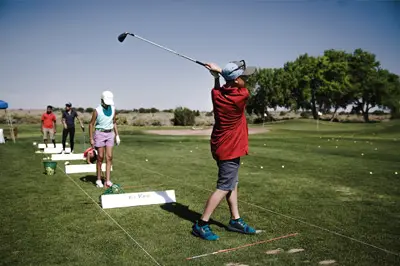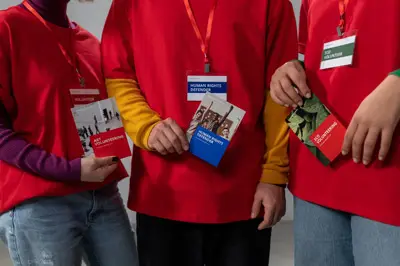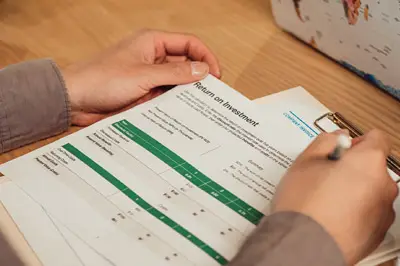How to Get Charity Event Sponsors: The Complete Guide
5 Key Steps to Recruiting Corporate and Charity Sponsors
With Example Sponsorship Packages, Thank You Letter Template and More
If your organization is planning to run a charity fundraiser, one of the best ways to help finance it, make a profit, and expand your outreach is by finding great charity event sponsors. Learn to add value to your fundraiser by creating a charity event that builds opportunities for your sponsors and engages your audience to connect with their brand.
Follow our simple guide, which will show you how to secure business and corporate sponsors for your next charity or fundraising event.
Here’s What We’ll Cover

What Is a Charity Event Sponsor?
A charity sponsor can be a person, local business, or large corporation that offers aid to your charity event in order to increase its success. Charity event sponsors can support your fundraiser with charitable donations or in-kind support.
In-kind donations include free services or products to add fun and value to your campaign and attract more followers. Local cafes, restaurants, spas, and shops can offer gift certificates, beauty treatments, food baskets, and other goods and services as in-kind sponsorship deals. Take a look at our top gift and donation choices.
Corporate sponsorships add value to your fundraiser in various ways, outside of funding your event. The promotional and marketing aspects of charity sponsorships are a great way to spread the word about your event. For example, say a local florist is sponsoring your fundraiser, they can display your fundraising posters in their shop and send a small sticker or card with your charity event’s information in each bouquet.

Finding Prospects to Sponsor the Charity Event
Individuals, businesses, and organizations can all be charity event sponsors. For our purposes, we will focus on businesses since, generally, it is businesses and not individuals that organizations seek for sponsorship support. Individuals can certainly be donors, and peer-to-peer events often refer to donors as sponsors. Here we are talking about business or corporate sponsors that offer a substantial amount of money or in-kind donation as sponsorship.

So, where do you start? Start with current supporters and local businesses. Ask your nonprofit’s board members, staff, volunteers, beneficiaries, and supporters if their companies or people within their social networks may be interested in sponsoring your fundraiser. Don’t forget your organization’s vendors – people you already do business with. It’s always easier when you already have a connection to build on.
An important thing to remember about your supporter networks is that they are constantly growing and changing. Most organizations do a great job of assessing their networks when first constructing sponsorship recruitment and prospecting plans. However, as your organization grows and you recruit volunteers and participants, your network will also be growing. Schedule a second and third assessment of your network, and actively seek connections that will aid the success of your charity events.

When working to find prospective sponsors outside of your organization’s network, a strong nonprofit brand is key to success. Review your organization and fundraising campaign’s brand, and let your prospects know why they would like to be associated with your organization.
Remember that many companies and organizations have money in their annual budget to help with charity work. So bear this in mind when researching corporate partners, and don’t forget to start asking for sponsorship as early as possible.
What Do Sponsors Get In Return for Sponsorships?
 Apart from the philanthropic side of sponsoring a fundraiser, companies and organizations sponsor charity events to keep old customers, gain new ones, make a profit, and build their brand. Charity events offer an ideal opportunity to engage niche audiences to get familiar with a business’s brand and create opportunities for their business.
Apart from the philanthropic side of sponsoring a fundraiser, companies and organizations sponsor charity events to keep old customers, gain new ones, make a profit, and build their brand. Charity events offer an ideal opportunity to engage niche audiences to get familiar with a business’s brand and create opportunities for their business.
It is crucial to remember that the relationship between nonprofits and sponsors should be mutual. While your charity receives funding to help create a successful event, sponsors expect marketing perks and exposure in return. When nonprofits grasp this idea, the potential of getting charity event sponsors on board can be limitless.
Take the example of a high-end car company sponsoring your charity event. This type of sponsorship could elevate your golf tournament fundraiser to a new level. Showcasing an aspirational brand to a largely male and affluent audience is a win-win for both the sponsor and registrant. Remember that your charity sponsors would only need to sell one car to get back their return on investment and gain potential new clients.
Some common benefits that nonprofit event sponsors receive include the following:

Inclusion in Promotional Materials
Charity events should offer real visibility for event sponsors.
- Where do you intend to promote your event, and how many people will you reach?
- How will sponsors be mentioned and highlighted? Opportunities include a link from your fundraising event website, logo inclusion on tournament flyers, mentions in press releases and social media networks, sponsor logos on event swag and custom apparel, and more)
Exposure at the Fundraiser
- Include event registrations with your top-level sponsorship packages. How many people are expected to attend the event or tournament? Let potential sponsors know their involvement will expose them to these new potential customers.
- Will sponsors have a tent or table onsite where they can educate people about their business and generate leads? Businesses are always looking for ways to reach new potential customers and a relaxed environment like a fundraising golf tournament or walkathon fundraiser.
- If a company sells event-appropriate products, your event could be a great venue for actual sales or handing out coupons and information.


Other Common Benefits for Event Sponsors
Charity events should offer real visibility for event sponsors.
- Increased exposure in the community
- Tax deductions – check with your organization’s tax adviser for details
- Opportunities for team building and employee development
How To Secure Charity Event Sponsorships in 5 Simple Steps
Getting sponsors for your fundraising events is vital to raising money and reaching your fundraising event goals. But how do you make it happen? Asking for sponsorship can be intimidating, and there is certainly an art to the ask. Where do you start?
Step 1: Create a Charity Sponsorship Proposal
Before you start looking for charity event sponsors, you will need to know:
- What type of fundraising event are you hosting?
- What can you offer your sponsors?
Addressing these two questions is a vital first step in planning your research and proposals to gain charity sponsorships and help fund your event. It can be a little daunting to ask for event sponsorships, but it will be worth all the effort once your fundraiser is up and running with the secured funding it needs to be a successful and lucrative charity campaign.
Once you have decided on the type of event you are running and established your donation tiers, start brainstorming with your fundraising team to decide the following about what sponsorship opportunities you can offer:
- Name Tag Sponsor – If your participants are all wearing name tags at your fundraiser, you can add the sponsor’s name for maximum exposure.
- Breakfast, Lunch, or Cocktail Party Sponsor – If you are providing food and drinks at your charity event, you can advertise the sponsor’s name as the food and beverage sponsor.
- Title Sponsorship – Maybe you can offer a title sponsorship where a person or organization would lead the charity event sponsorship and gain most of the name recognition. What makes being a title sponsor so valuable is that their brand name is integrated into the fundraiser, for example, The Local Coffee Women’s Charity Auction. Just make sure that for this amount of brand recognition you establish a higher price point. Finally, make sure that the title sponsorship is aligned with the values and mission of your fundraiser.
- How much signage will your sponsors get?
- How many tickets (if an auction or raffle) will they receive with their sponsorship?
- Will they receive exhibition space at the fundraiser, so they connect with the audience?
- Will they be promoted ahead of the charity event, how and where?


Step 2: Do Your Research
One of the most important steps to securing a corporate sponsor is to research your potential sponsor. It’s vital to understand what you, your organization and your fundraiser can offer to bring your audience together and how you plan to promote their demographics and psychographics into your charity event. Here are just a few factors to consider:
- Gender – is your target audience predominately female, male, or both?
- Age – are you looking to attract a younger audience, a more mature one, or both?
- Income Level – will donors be likely to contribute generously?
- Lifestyle – understanding likes and dislikes, for example, what type of media do they consume?
Once you have identified these demographics and psychographics, you will have mastered two key aspects that will guarantee a successful fundraiser:
- By understanding these factors it will be easier to choose a direction to go in when marketing your cause. Acknowledging this information can help you connect on a deeper level with your donors.
- You can identify the charity sponsors that align with your target audience, your mission and values and would be most eager to connect with them.
So in a nutshell, do your homework by researching your prospect audience’s needs. By getting a grasp on this vital information, you will be able to get the most out of your charity event sponsorships.
Step 3: Craft and Practice the Perfect Pitch
Now’s the time to approach potential sponsors. Nervous? That’s normal. Take the time to practice your ask and role play with people on your Board or committee, so that you feel more comfortable.
While it is certainly possible to ask for sponsorship via a Zoom meeting, it may not be as effective. When possible and especially when asking for a major gift donation, try to conduct the sponsorship ask face-to-face.
It’s crucial to be prepared. You’ve already done that by creating your information package to show your sponsors the benefits and opportunities of sponsoring your charity event. Your target sponsors need to understand how they will successfully be integrated into your fundraiser, so make this a priority when pitching. Layout your sponsorship opportunities in a clear, engaging manner to show your sponsors that you have a strong grasp of your audience and how they will add value to their organization and your fundraiser.
To present the perfect sponsorship pitch, don’t forget to:
- Reach out to your potential sponsors about four months before your event. Give your sponsors plenty of time to organize any necessary paperwork and approvals.
- Make the layout clear and simple to understand, as you want to conduct an engaging pitch.
- Show your sponsors how you have researched your target audience, including your collected demographics and psychographics.
- Include testimonials and case studies from past sponsors to highlight former event sponsorship successes.
- Make sure you collect enough relevant data to be ready to answer any questions that your sponsors might throw at you. You want to prepare and over-prepare to ensure you bag that sponsorship.
Pro Tips To Execute a Winning Charity Sponsor Pitch
- Emailing your brochures and sponsor packages won’t cut it! Make sure to make your pitch in a personal meeting – it’s vital that you talk to your potential sponsors in person or at least online.
- Get your sponsors excited about your charity event by creating something customized for them. Make it engaging, touching, and interactive, selling your mission and values.
- Make sure you listen to your sponsor’s needs in order to come to a mutual agreement. As part of the charity sponsorship deal, they will also have goals they want to achieve, such as promoting their brand, selling products on-site, or registering new memberships. So, listen to their expectations and goals to come to the best charity sponsorship agreement possible for them and for the success of your nonprofit.
- It’s vital to establish a payment agreement upfront. You can decide on receiving the sponsorship money in full or a deposit, with the balance due just before the event. Never accept to be paid after the fundraiser, as you can’t guarantee you’ll be giving the funds.


Step 4: Honor Sponsors at Your Event
Once you have delivered a killer pitch and secured your charity event sponsors, it’s vital to make sure you honor them at your fundraiser. This starts during the online fundraising component of your campaign. Even if you are hosting a virtual event, there are many opportunities to get your corporate sponsor’s logo in front of your audience. Make sure to:
- Hold up your end of the sponsorship agreement regarding the amount of signage and advertising you promised.
- Promote their brand on social media posts and your fundraising webpage.
- Mention them in any promotional videos before and during the event.
- Give them a listing in your charity event’s handout, flyers, and posters.
Don’t forget that honoring your sponsors and recognizing their efforts pre and post-event will build strong relationships. This increases the chance of future support and investment in your charity events.
Step 5: Follow-up and Thank Sponsors
A big thank you goes a long way! Bear this in mind at the end of your event when it’s time to follow up with your sponsors. It’s essential to catch up with sponsors immediately after the fundraiser so that you retain a strong, business-like relationship with them. Just like it’s easier to get sponsors from your supporter network, it’s easier to keep current sponsors on board from year to year than to find new sponsors.
Provide feedback to your charity sponsors about:
- Did you reach your fundraising goal?
- How much the charity event grossed and earned after expenses.
- What impact the fundraiser will have on the community and individuals?
- Send photos and testimonials of the event and tag sponsors in photos on social media, commenting on how valuable their support was.
- If sponsors require a number of sign-ups or email subscriptions as part of their sponsorship agreement, let them know the numbers and ensure all relevant information is passed over to them.
Next, make sure to thank your sponsors for their support. You can do this by creating a personalized digital message or handwritten note with a selection of photos from your fundraiser.
When working with a business sponsorship, look for ways to make the relationship less transactional and more meaningful. Invite the business owners to visit your nonprofit or to attend a VIP event as your guest. Have Board Members or beneficiaries of your organization write or call them to explain the value of their partnership.

Crafting Charity Sponsorship Thank You Letters
Send a customized thank you letter via post or email that includes the following:
- Address the letter personally to your donor – don’t use greetings such as ‘Dear Sir/Madam’.
- Be concise – your letter is more likely to be read if it doesn’t drag on.
- Sign the letter to personalize it.
- Tell your sponsors about how the funds raised will be used and the impact they have made. Attach photos and testimonials if appropriate.
- Make sure to show gratitude and not ask for more support immediately. Continuing to sell at this juncture is likely too aggressive and could lead to donor attrition. You’ll have time to do this later.
- Send the letter within 48 hours after the charity event when possible, so the event is fresh in everyone’s minds.

By showing appreciation to your donors, you are not only recognizing their generous support but also encouraging future giving. If you need help getting started, look at our Sponsor Thank You Letter template.
Nonprofit Event Sponsorship Packages and Levels
Development staff should create event sponsorship packages, which represent donation tiers for sponsors. Sponsorship tiers make your life easier when explaining the rewards and amount of exposure each sponsor is entitled to.
Sponsorship levels and packages are not set in stone and can be customized for each business you approach. The more you know about the business and its marketing strategy, the better you can make a custom plan that speaks to them. So remember, it’s important to have an idea of the sponsorship level and corresponding benefits for all businesses, but be flexible and focus on building the relationship first.
Sample Golf Tournament Sponsorship Levels
If you are hosting a charity golf tournament, you could offer the following donation tiers:
| TITLE SPONSOR | $10,000 – $25,000 |
|
|---|---|---|
| GOLD SPONSOR | $5,000 – $10,000 |
|
| SILVER SPONSOR | $2,500 – $5,000 |
|
| DINNER or LUNCH SPONSOR | $1,500 – $3,500 |
|
| HOLE-IN-ONE or OTHER CONTEST SPONSORS | $1,000 |
|
| TEE or HOLE SPONSORS | $500 |
|
Sample Breakfast or Luncheon Sponsorship Levels
If you are hosting a high-end breakfast fundraiser or charity gala, you could offer the following donation tiers:
| TITLE SPONSOR | $7,500 – $10,000 |
|
|---|---|---|
| CHAMPION SPONSOR | $2,500 – $5,000 |
|
| ADVOCATE SPONSOR | $1,000 |
|
| BUSINESS SPONSOR | $500 |
|
| TABLE SPONSOR | $250 |
|
It’s important not to arrive at the ask with one sponsorship option for sponsors to approve or deny. Provide charity sponsorship levels and options and customize your sponsorship packages for each prospect, swapping things in and out based on the prospect’s needs, interests, and budget.
Finally, it’s crucial to remember that the relationship between nonprofits and sponsors should be mutual. While your charity receives funding to help create a successful event, the sponsors should gain great exposure and marketing opportunities. If you can grasp how to add value to your charity event and the sponsor’s brand, your fundraising success will be limitless.
